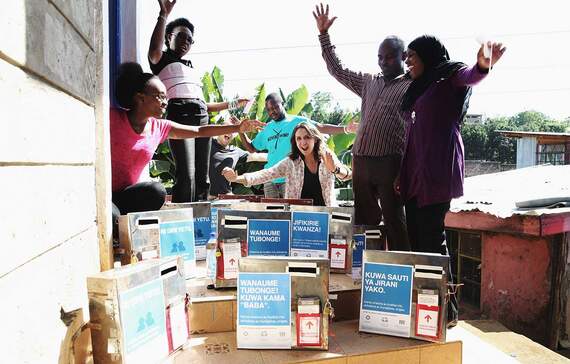In response to a 2014 survey, 43% of sexually active young women in Kibera, Kenya—one of Africa’s largest urban slums—reported that their first sexual experience was forced. As in many other places around the world, gender violence in Kibera is often viewed as a women’s issue, with men relegated to the sole role of perpetrators.

SHOFCO runs a variety of community services in Kibera, Kenya, and with its Amplify grant is working to increase the reporting of gender-based violence to its caseworkers.
Determined to bring that statistic down and engage men and boys in their programing, Shining Hope for Communities (SHOFCO), an organization that combats urban poverty and gender inequity, applied to Amplify’s Women’s Safety Challenge.
Together, over the course of three years, SHOFCO and IDEO.org prototyped and piloted the Speak Up Boxes— a simple and confidential system for victims and allies to report cases of sexual violence. Reports connect them to case workers for counseling, shelter, medical treatment, and legal advocacy.
The Speak Up Boxes were the product of an initial brainstorm with community leaders and SHOFCO staff members. By placing the boxes across villages in Kibera, a major barrier to reporting was removed: distance. IDEO.org’s design team built the branded boxes to be a proxy for the familiar bright blue SHOFCO building that acted as a beacon for many women living nearby to report crimes against them.

Prototypes for the initial Speak Up Boxes included a sturdy design and key community messages.
After running a live prototype of 49 Speak Up Boxes for several months, SHOFCO learned a few key lessons. Although the boxes were extremely effective in raising awareness of the gender department services, victims preferred reporting directly to a person. Many victims called the hotline listed on the box directly or reached out to the business owner of the building where their local Speak Up box was mounted instead of filling out a reporting slip. Low literacy rates in Kibera also proved to be a barrier, with some survivors asking children or neighbors to fill theirs out.
Iterating on the prototype, IDEO.org and SHOFCO evolved the design of the outreach and reporting system to a full pilot in early 2016. Speak Up Boxes now focus on connecting victims with a person who can guide them through the reporting process—maintaining their role as beacons in the community, but ensuring a human element in the moment of reporting where needed. Two SHOFCO-trained volunteers are assigned to each box to act as ambassadors, available to help reporters who need it.
During the pilot, IDEO.org’s took what worked in the prototype and adapted it for SHOFCO’s other services. For their popular health clinics, for example, we designed a new intake process for triage nurses, which creates another private person-to-person opportunity for victims to report crimes against them and get connected with the gender department.






